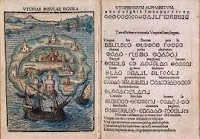
By John Esterle
What does utopia mean to you?
For most of us the word conjures up images of an idyllic world -- so idyllic in fact as to be seen as something that's completely unrealistic or has an inevitable dark, social engineering side to it. Filmmaker Sam Green creatively explores different facets of the notion of utopia and the utopian impluse in both his new documentary, The Universal Language (TWI provided some support) and in his "live" documentary, Utopia in Four Movements, which he's taken on the road this past year.
The Universal Language is a lovely profile of Esperanto, tinged with hope and sadness, humor and humanity. Watch for it when it comes out. I haven't seen Utopia in Four Movements yet but I hope to someday as it sounds like a compelling answer to a question I often wonder about: What sticks in a media saturated world?
I had a very stimulating lunch with Sam yesterday and we covered a lot of territory in our conversation, including themes that often crop up in this blog: the importance of storytelling, of language, and of attending to how we engage with each other to imagine and create a better world.
Here's a quote from an interview Sam did that particularly resonates with me:
"I'm not so interested in "a utopia" -- some kind of place or society that would be utopia. I'm much more interested in the Utopian -- a moment or gesture or act that evokes a radically better world. Art, I think, can certainly do this. In fact, art is very well-suited for the task. My own personal feeling is that art that is proscriptive, that flattens things out to bullet points and clear-cut answers is often dull. What I like is art that embraces complexity and contradiction and the messiness of human experience and who we are. I like art that opens up possibilities."
Besides agreeing with what he says here, I'm struck at how I could replace "art" with "dialogue" and it have it still ring true for me.
Anyway, as I look out my window on a sunny San Francisco day (it's been cold and gray a lot lately) I'm thinking of how dreaming big links with being in the moment, and of how TWI's vision is grounded in -- dare I say -- a Utopian belief that we can transform our world one conversation, one connection, one relationship at a time.
The Universal Language is a lovely profile of Esperanto, tinged with hope and sadness, humor and humanity. Watch for it when it comes out. I haven't seen Utopia in Four Movements yet but I hope to someday as it sounds like a compelling answer to a question I often wonder about: What sticks in a media saturated world?
I had a very stimulating lunch with Sam yesterday and we covered a lot of territory in our conversation, including themes that often crop up in this blog: the importance of storytelling, of language, and of attending to how we engage with each other to imagine and create a better world.
Here's a quote from an interview Sam did that particularly resonates with me:
"I'm not so interested in "a utopia" -- some kind of place or society that would be utopia. I'm much more interested in the Utopian -- a moment or gesture or act that evokes a radically better world. Art, I think, can certainly do this. In fact, art is very well-suited for the task. My own personal feeling is that art that is proscriptive, that flattens things out to bullet points and clear-cut answers is often dull. What I like is art that embraces complexity and contradiction and the messiness of human experience and who we are. I like art that opens up possibilities."
Besides agreeing with what he says here, I'm struck at how I could replace "art" with "dialogue" and it have it still ring true for me.
Anyway, as I look out my window on a sunny San Francisco day (it's been cold and gray a lot lately) I'm thinking of how dreaming big links with being in the moment, and of how TWI's vision is grounded in -- dare I say -- a Utopian belief that we can transform our world one conversation, one connection, one relationship at a time.

No comments:
Post a Comment